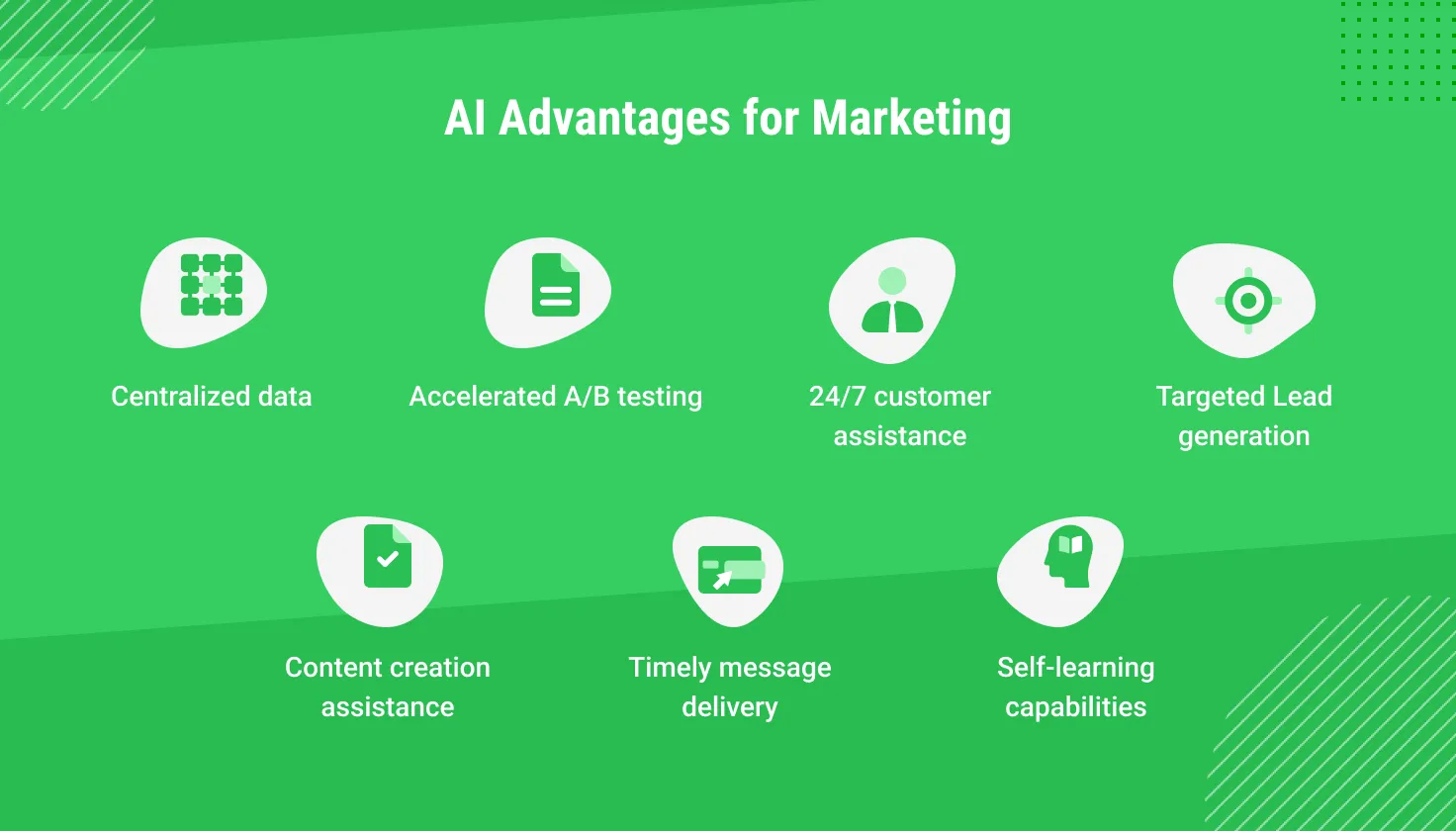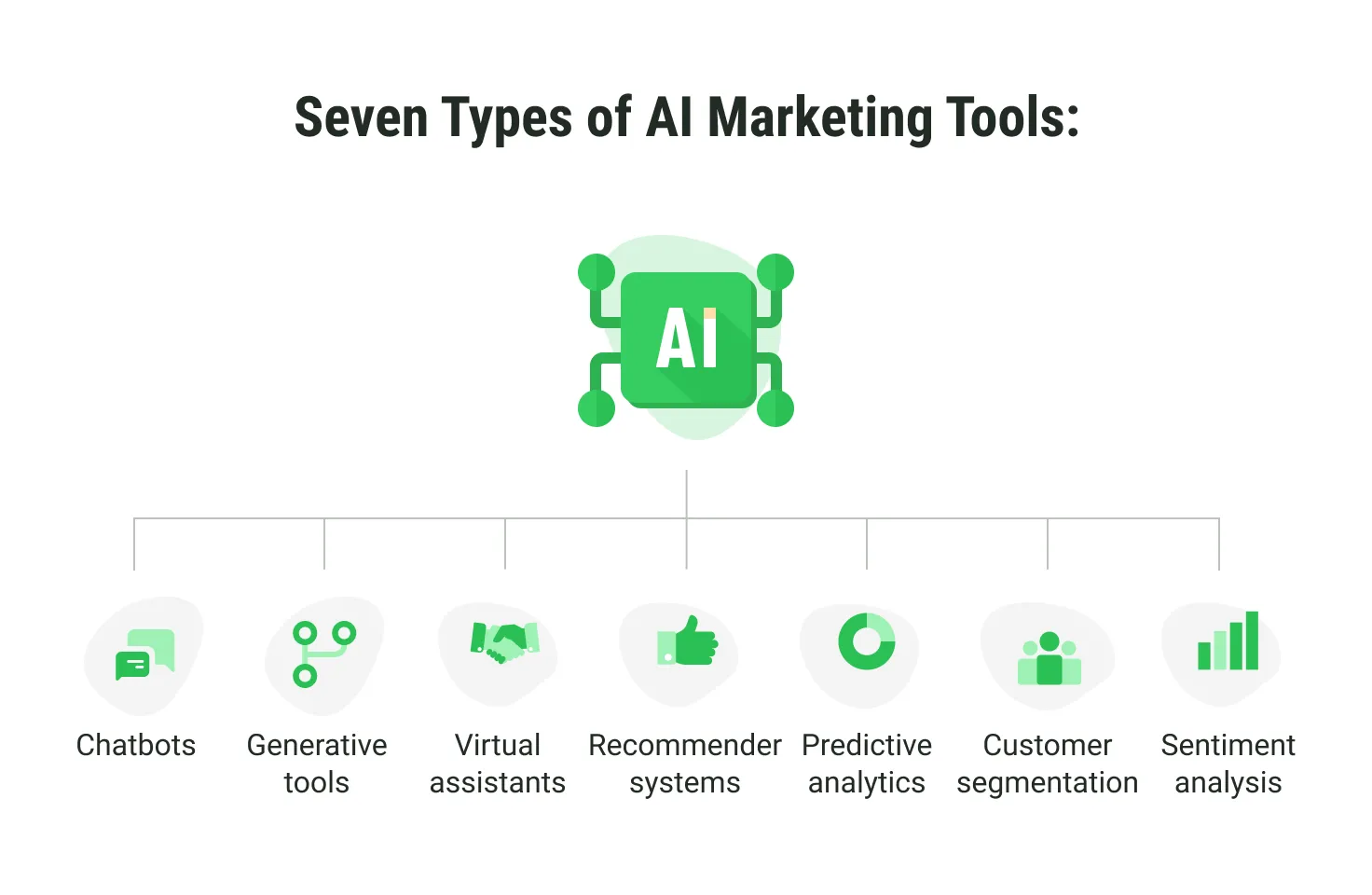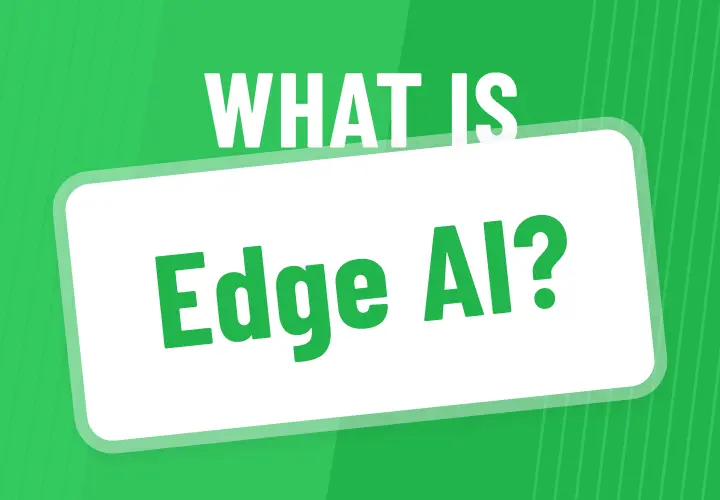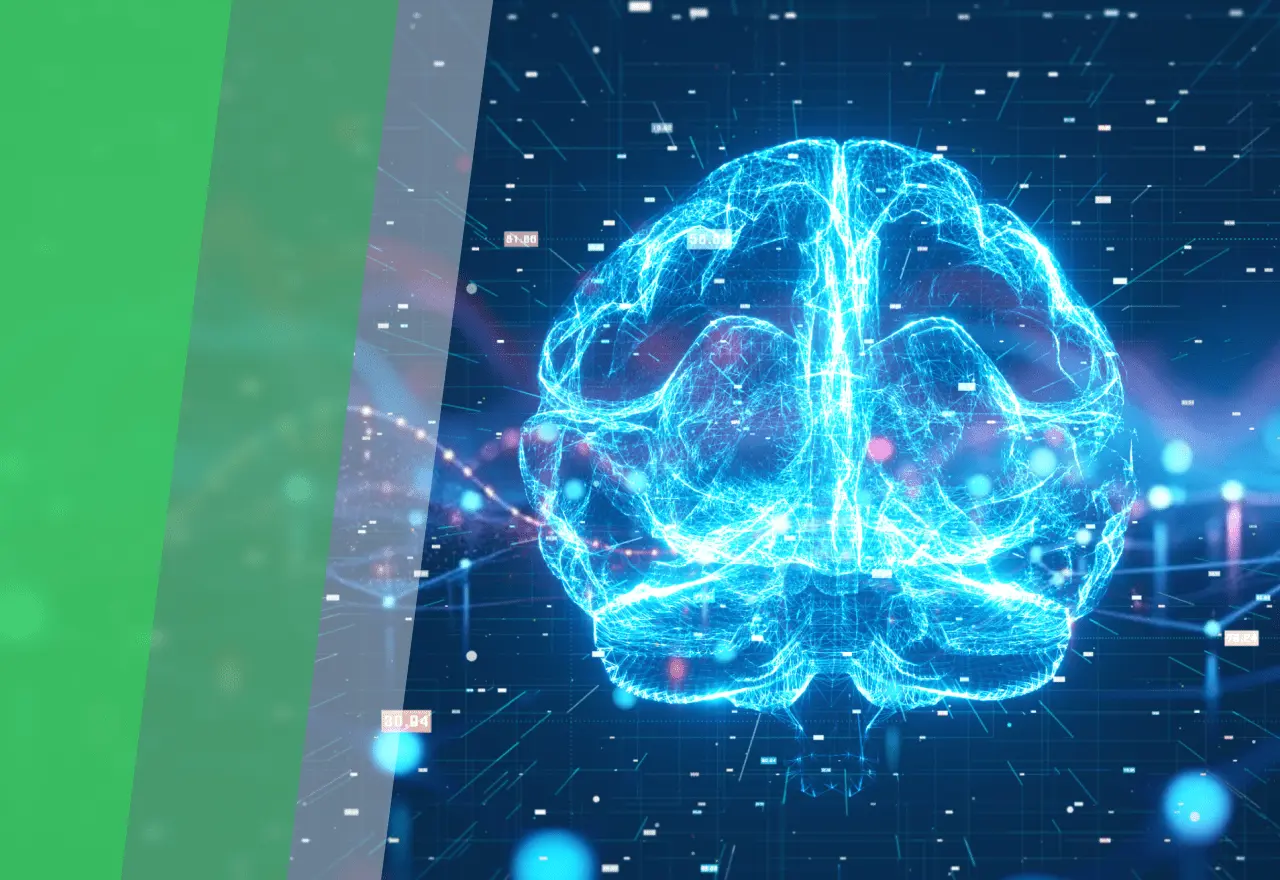Top 10 AI Marketing Solutions in 2025
Table of contents
- What is AI Marketing?
- Benefits of AI Implementation in Marketing
- AI Advantages for Marketing
- Seven Types of AI Marketing Tools
- Top 10 AI Marketing Tools in 2025
- 1. Zapier
- 2. Jasper.ai
- 3. Grammarly
- 4. ManyChat
- 5. FullStory
- 6. Writer.com
- 7. Surfer SEO
- 8. Smartly.io
- 9. Seventh Sense
- 10. Copy.ai
- Challenges in AI Marketing
- In Conclusion
In the ever-evolving marketing landscape, staying ahead is not just a strategic advantage; it's imperative for success. The global trend of AI adoption among other E-commerce development services and beyond is clear: according to Statista, a top-ranked statistics website, the global AI market share is projected to reach 107.5 bln U.S. dollars by 2028, a nearly nine-fold increase from 2024. And it is accompanied by a growth of marketing AI solutions that have become the linchpin for brands and businesses aiming to thrive in a competitive digital sphere: more than 80% of industry experts integrate some form of AI solutions(link to the new service page) into their online marketing activities. This article will help you understand more about this expansive topic and adjust your strategy accordingly.
What is AI Marketing?
AI marketing, or Artificial Intelligence Marketing, leverages the power of AI to revolutionize marketing processes. This involves utilizing AI technologies to:
- Analyze data
- Predict customer behavior
- Generate creative content
- Monitor economic trends that impact marketing initiatives
In digital marketing, AI is pivotal in expediting tasks, ensuring speed and efficiency.
AI in marketing is employed for diverse use cases. It facilitates data analysis by automating the collection and sorting of large volumes of marketing data from various campaigns, eliminating manual sorting. Additionally, AI plays a crucial role in content generation, producing various marketing materials, from video captions to web copy, blogs, and more. Another facet of AI marketing, Natural Language Processing (NLP), enables the generation of human-like language for various purposes, including content creation and personalized customer experiences.
Furthermore, AI solutions for marketing enable automated decision-making, assisting businesses in strategizing based on historical data and external inputs. The end goal is to create adaptive marketing campaigns that learn from their own reactions and responses, delivering personalized experiences to target audiences in a seemingly automated manner.
Benefits of AI Implementation in Marketing
The utilization of AI in marketing offers several compelling advantages. Firstly, it centralizes data, providing marketers with a consolidated and accurate source for data storage and utilization, which streamlines decision-making and campaign effectiveness. AI's ability to accelerate A/B testing through algorithms leads to more efficient testing processes and data-driven insights, enabling marketers to fine-tune their strategies effectively.
AI-powered virtual agents, such as chatbots, offer 24/7 customer assistance and use customer data to inform sales and advertising efforts, improving the overall customer experience. Additionally, AI's prowess in targeted lead generation and client segmentation empowers marketers to reach the right audience with personalized messages, ultimately optimizing lead qualification and nurturing.
Moreover, AI's capability to generate marketing content, albeit not replicating human creativity, assists in content creation, ensuring that marketers have a consistent flow of content suggestions and ad copy. Furthermore, AI analyzes customer preferences to deliver timely messages, improving campaign ROI and maintaining customer engagement. Finally, AI's self-learning and continuous improvement capabilities make it an invaluable asset as it evolves and becomes increasingly accurate over time, automating and optimizing marketing operations to stay ahead in the competitive digital marketing landscape.
AI Advantages for Marketing
- Centralized data
- Accelerated A/B testing
- 24/7 customer assistance
- Targeted Lead generation
- Content creation assistance
- Timely message delivery
- Self-learning capabilities

Seven Types of AI Marketing Tools
Before proceeding to the ten best AI marketing tools, let's introduce some additional structure by defining their most common types:
- Chatbots: These use AI technologies for human-like conversation, enhancing customer service, and addressing product inquiries.
- Generative tools: Leveraging deep learning, they create content such as blog posts, images, and emails, requiring human input and review for accuracy.
- Virtual assistants: AI-driven virtual assistants aid in tasks like scheduling and transcribing, boosting marketing team efficiency.
- Recommender systems: These AI marketing solutions utilize machine learning to provide personalized product recommendations based on customer data.
- Predictive analytics: AI analyzes sales data to forecast market demand and optimize campaign scheduling and pricing strategies.
- Customer segmentation: AI algorithms segment customers by geography, demographics, and purchase history for targeted marketing efforts.
- Sentiment analysis: Using natural language processing, AI monitors social media posts and comments to summarize user feedback more effectively.

Top 10 AI Marketing Tools in 2025
1. Zapier
Zapier is an automation tool that connects various systems and applications, enabling the automation of tasks and workflows. It's a versatile tool that can streamline various marketing processes, making it a must-have for marketers seeking efficiency.
- AI features: No-code automation, if-then logic for marketing automation.
- Pricing: Free, Starter from $19.99/month, Professional from $49/month.
- G2 Reviews: 4.5/5 (1,000+ reviews).
2. Jasper.ai
Jasper AI, formerly known as Jarvis, is a versatile AI-powered copywriting tool that can generate content for email marketing campaigns, product descriptions, blog posts, and landing pages. It's a valuable resource for content creation with a user-friendly dashboard, making it suitable for marketers looking to streamline content generation.
- AI features: AI content creation, chatbot, art creation, brand voice.
- Pricing: Creator from $39/month, Teams from $99/month, Business with custom pricing for ten users or more
- G2 Reviews: 4.7/5 (1,000+ reviews).
3. Grammarly
Grammarly analyzes content for improvement, focusing on traditional syntax and grammar rules. It is compatible with various apps, such as Gmail, Word, Twitter, and Facebook, streamlining writing within them through a convenient overlay mode that offers suggestions. Grammarly's AI highlights errors and offers suggestions, including spotting redundancies and inconsistencies in style.
- AI features: Grammar and spelling correction, AI writing, tone selection.
- Pricing: Free, Premium from $12/month, Business from 15$/month
- G2 Reviews: 4.7/5 (3,000+ reviews).
4. ManyChat
As a Chat Marketing platform, ManyChat simplifies the setup of automated campaigns without the need for coding skills or a large budget. It connects businesses with their audience across Instagram, Messenger, Facebook, SMS, and email for marketing messaging via a single dashboard.
- AI features: Interactive chatbot for customer messaging.
- Pricing: Free (with limitations), Pro at $15/month, and Premium with custom pricing.
- G2 Reviews: 4.6/5 (100+ reviews).
5. FullStory
FullStory is an AI-driven Digital Experience Intelligence platform for analyzing user experiences on websites. It helps marketers gain insights into customer behavior and offers opportunities to enhance the user experience, making it a valuable asset for improving website performance.
- AI features: Real-time customer experience insights and optimization.
- Pricing: Custom (demo required).
- G2 Reviews: 4.5/5 (350+ reviews).
6. Writer.com
Writer.com is an AI-powered content writing platform designed for marketing teams. It provides features like autocorrect, grammar and clarity checks, making it a valuable tool for maintaining consistent and professional content across marketing materials.
- AI features: CoWrite, recaps, style guide for content creation.
- Pricing: Team from $18/month per user.
- G2 Reviews: 4.6/5 (10+ reviews).
7. Surfer SEO
Surfer SEO is a tool for content optimization that assists in creating SEO-friendly content by analyzing keyword density, readability, and more. It helps improve content's search engines rankings, making it an essential tool for content strategists.
- AI features: Keyword research, content editor, SEO audits.
- Pricing: Basic from $49/month, Pro from $99/month.
- G2 Reviews: 4.8/5 (400+ reviews).
8. Smartly.io
Smartly.io, a leading SaaS digital advertising platform, offers end-to-end technology and exceptional customer service to brands like Walmart, L'Oreal, and Disney/ESPN. The platform excels in helping brands reach and engage audiences on major media platforms, including Facebook, Instagram, TikTok, and Google.
- AI Features: Automated planning, multi-channel scaling, collaboration.
- Pricing: Custom (demo required).
- G2 Reviews: 4.4/5 (400+ reviews).
9. Seventh Sense
Seventh Sense is a sales and marketing tool empowering marketers to collect daily data about current and potential customers. This data analysis enhances sales, marketing engagement, and brand awareness, minimizes customer experience issues, reduces revenue loss due to attrition, and boosts the overall efficiency of your marketing strategy.
- AI Features: Email delivery optimization, A/B testing, deliverability auditing.
- Pricing: Business for HubSpot from $64/month, Enterprise for HubSpot (custom pricing).
- G2 Reviews: 4.8/5 (15+ reviews).
10. Copy.ai
Copy.ai, an AI writing tool, utilizes machine learning based on OpenAI's GPT-3 to create diverse content, such as blog headlines, emails, social media posts, web copy, and more. With over 25 supported languages and user-friendly tools, Copy.ai is a valuable resource for novice users looking to harness generative AI for copywriting.
- AI Features: User-friendly content generation, multiple languages.
- Pricing: Free, Pro at $36/month for five users.
- G2 Reviews: 4.8/5 (160+ reviews).
Challenges in AI Marketing
Despite the potential of AI marketing solutions to help marketers better understand customer needs and make data-driven decisions in real-time, integrating them into marketing operations presents challenges. Here are three main concerns to address for achieving success:
Training and data quality:
AI tools require training to understand organizational goals, customer preferences, and context. This process depends on high-quality, accurate, and timely data. Inadequate data quality can lead to inaccurate marketing decisions.
Privacy concerns:
The use of customer data must align with ethical and legal standards, such as GDPR. Failure to do so can result in penalties and damage to an organization's reputation. AI marketing tools should be programmed to respect these guidelines.
Demonstrating value:
Proving the value of AI marketing investments to stakeholders can be challenging. While ROI and efficiency metrics are clear, demonstrating improvements in customer experience and brand reputation requires proper measurement tools.
In Conclusion
AI solutions for marketing are the driving force behind the marketing landscape of 2025, and adopting these technologies is no longer an option but a necessity. The global surge in AI adoption, coupled with its remarkable potential, has given rise to a host of innovative tools that empower marketers to streamline operations, save time, understand their audiences better, and make data-driven decisions in real-time.
Blending human creativity with artificial intelligence continues to shape the marketing landscape in unprecedented ways, and with the right AI marketing tools, brands and businesses can position themselves as leaders, setting the stage for innovative and customer-centric marketing strategies. Explore Emerline's expertise in building AI business solutions — our experts can equip you with a cutting-edge AI marketing solution tailored to your business's unique needs.
Updated on Feb 10, 2025





